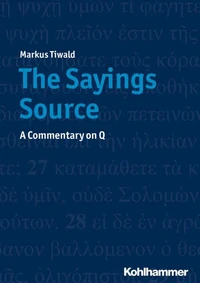The Q Hypothesis Unveiled. Theological, Sociological, and Hermeneutical Issues behind the Sayings Source
Par : , , , ,Formats :
Disponible dans votre compte client Decitre ou Furet du Nord dès validation de votre commande. Le format PDF est :
- Compatible avec une lecture sur My Vivlio (smartphone, tablette, ordinateur)
- Compatible avec une lecture sur liseuses Vivlio
- Pour les liseuses autres que Vivlio, vous devez utiliser le logiciel Adobe Digital Edition. Non compatible avec la lecture sur les liseuses Kindle, Remarkable et Sony
 , qui est-ce ?
, qui est-ce ?Notre partenaire de plateforme de lecture numérique où vous retrouverez l'ensemble de vos ebooks gratuitement
Pour en savoir plus sur nos ebooks, consultez notre aide en ligne ici
- Nombre de pages288
- FormatPDF
- ISBN978-3-17-037443-0
- EAN9783170374430
- Date de parution05/08/2020
- Protection num.Digital Watermarking
- Taille3 Mo
- Infos supplémentairespdf
- ÉditeurKohlhammer
Résumé
The essays collected in this volume are the proceedings of an international conference on the Sayings Source Q held in Essen, Germany in August 2019. The scholars contributing to this volume generally support the Q hypothesis. Nevertheless, they want to submit their own conceptions to scrutiny. Especially the question as to whether Q scholars are driven by unscholarly projections or prejudices was the subject of debate.
Sometimes also exegetes follow trends and fashion. Therefore, the central topic of this volume is a critical self-reflection on the hermeneutical options (and perhaps also biases) in Q Research.
Sometimes also exegetes follow trends and fashion. Therefore, the central topic of this volume is a critical self-reflection on the hermeneutical options (and perhaps also biases) in Q Research.
The essays collected in this volume are the proceedings of an international conference on the Sayings Source Q held in Essen, Germany in August 2019. The scholars contributing to this volume generally support the Q hypothesis. Nevertheless, they want to submit their own conceptions to scrutiny. Especially the question as to whether Q scholars are driven by unscholarly projections or prejudices was the subject of debate.
Sometimes also exegetes follow trends and fashion. Therefore, the central topic of this volume is a critical self-reflection on the hermeneutical options (and perhaps also biases) in Q Research.
Sometimes also exegetes follow trends and fashion. Therefore, the central topic of this volume is a critical self-reflection on the hermeneutical options (and perhaps also biases) in Q Research.






